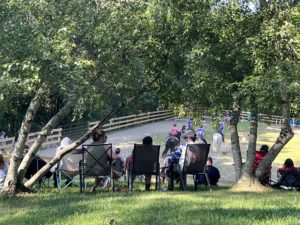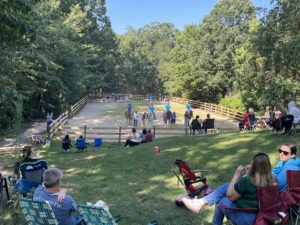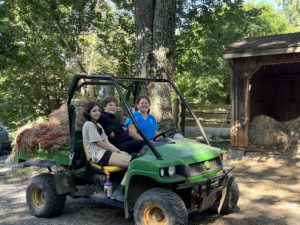“Horses helping people.” It’s been Hoofbeat’s guiding principle since our founding in 1993. We offer accredited therapeutic horseback riding services to adults and children in Rockbridge, Virginia and neighboring communities. Hoofbeats serves people with mental, physical, or emotional disabilities, trauma, or chronic diseases and a limited number of able-bodied riders. Find us on Mt Atlas road right off of Rt 11 near Timber Ridge, where our staff, volunteers and horses serve many riders every year. Our facility offers a mounting ramp, arena, indoor classroom space, and wooded sensory trail. Come visit us soon!
Click here to find out how to contact us!
- Breakfast Club Audience 2023
- Breakfast Club Arena 2023
- Barn rats 2023
How the dream began
The Hoofbeats story began decades ago, when a friendship between two extraordinary women launched a wild dream into reality. For Carol Branscome, horses were always a life calling. “When I was little, I used to look through magazines and when I would find a picture of a horse, I would cut it out and paste it to my clothes,” she explained, laughing. “I have never looked at anything else. I’ve never done anything else. Horses have always been my thing. I have been totally focused on it.”
Trish Cunningham (formerly Trish Rogers) had loved horses since childhood, reading every horse book she could get her hands on, and drawing horses on every scrap of paper and book cover. However, Trish put horses hold for a while to pursue both a passion for science and a desire to help people. When she was in middle school, she lost her 18-year-old brother to leukemia, and her goal became a career in cancer research. Trish received a BA in Biology from Wake Forest University and a Ph.D. in Immunology and Microbiology at UC Berkeley. She went on to do post-doctoral research in Molecular and Developmental Biology at Virginia Tech, wrote some successful federal research grants, and stayed on to work at VT as an Adjunct Research Professor in this field.
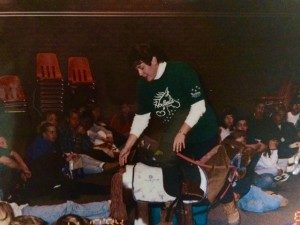
Trish Cunningham presenting to 90 students at Stuarts Draft Middle School during “Living with Disabilities Week.” (1994)
Nearly 25 years ago, these two women – the career horsewoman and the molecular biologist – crossed paths at a stable in Blacksburg, 80 miles south of where Hoofbeats eventually became reality. It was the perfect combination of personalities and vision.
While Trish was working at Virginia Tech, she started riding horses at the barn that Carol was managing. By this time, Trish was still passionate about her research, but she wanted to be more directly involved in helping people.
Carol said she recognized a kindred spirit and a friend as soon as they met. For her, special education, rehabilitation, and horses were a natural combination of her life pursuits. Her whole childhood was spent at horse barns, and so when it came time to choose a college, she went to Radford University for their equestrian team. She started out as an English major but then, as a senior, realized that she had accidentally already earned a sociology degree because she had taken every sociology and abnormal psychology class she could. “I was always writing papers on animal relationships and society and how animals are great for depression and great for kids who have post-traumatic stress and for rape survivors. I’m always tracking down these studies about animals,” she said.
After college, she heard that a children’s home in Danville was trying to start a therapeutic riding program and she called them about donating one of her horses. When the recreational directors came to look at the horse, she realized they knew nothing about horses. “I told them, ‘Ya’ll don’t have any idea what you’re getting into. You need to hire me. You need me,’” she said. Evidently, they agreed and called her that night to offer her a job. “That was my laboratory,” she said. She spent five years working and learning there, finding creative ways to reach children, many who acted out violently or had experienced severe trauma.
Right Time, Right Place
As they spent more time together, Carol and Trish realized they shared a passion for horses and for helping people physically, mentally, and emotionally. Therapeutic riding was the natural and obvious combination. Trish had the organizational and grant-writing skills and experience, and Carol had the horse knowledge. “The minute we met each other, we clicked, we had this vision, saw this need, and things just started to fall in place,” Trish said. “We began talking seriously about the idea of starting a center. I think God had a plan for us and helped all of the pieces fall into place—from finding an area that needed our service, to finding a good location for the program, to putting us in contact with people who could help us, and eventually to helping us with good weather for special events when we needed it.”
Trish’s then-husband, Maj. Gary Rogers, was hired as a professor at the Virginia Military Institute in Lexington, which necessitated a move for them from Blacksburg to Rockbridge County, Virginia. At the time, the closest therapeutic riding center in Roanoke had a two-year wait list, and there were no similar services in the Rockbridge area. Trish and Carol decided this was a need they wanted to fill and decided to take a risk. Trish and her then-husband bought a historic farm property in Natural Bridge on which to build the center, and both families moved from to Rockbridge County to begin building their dream.
Getting Off the Ground
The first year was full of strenuous physical and mental labor. The farm facility itself needed a lot of construction. On top of that, Trish was tackling a mountain of paperwork to successfully apply for federal nonprofit status. Although they were starting from scratch, Trish said she was thankful they had a lot of support from a national network of therapeutic riding centers. “We didn’t have to reinvent the wheel,” she said. Through the NARHA (North American Riding for the Handicapped Association, now PATH) network, they received guidance from other centers around the country on everything from lessons, to business practices, to volunteer trainings, to fundraising.

Our debut news article! (May 1994)
Fundraising was a big part. They started by travelling to South Florida to visit Trish’s family and network in the area. “God gave me the best family possible,” Trish said. Her parents, Leo and Evelyn Vecellio, were overwhelmingly supportive when she told them she was leaving a scientific research career to start a nonprofit. “There was risk involved. A lot of people took a chance. My parents and my aunt, Erma V Grogan, were the first ones to step up. My parents provided so much financial and moral and prayer support. If it hadn’t been for them, we wouldn’t have made it those first few years.” All of these original generous supporters are now deceased, but The Vecellio Family Foundation and a foundation that Trish and Steve Cunningham started, The LEEPS Foundation, has continued to financially support Hoofbeats for all of these years.
When they moved to Rockbridge County, Trish and Carol had to lay groundwork on local outreach. They approached the Rotary, community centers, rehabilitation groups, newspapers, local schools and universities. “We did a lot of explaining to many groups just what therapeutic riding was,” said Trish. “We were trying to convince people.” To be successful, they knew they needed to find not only clients, but also volunteers, local donors, and the general support and goodwill of a small, tight-knit community.
The turn-around time was incredibly short, considering that the farm was not set up for horses or riding. Trish and her then-husband closed on the Natural Bridge site in July of 1993; they immediately began converting the bank barn into a horse facility with stalls, hay storage and an office and handicap-accessible bathroom, plus they built a riding arena, mounting ramps, and horse pastures. In the years following, a picnic shed, classroom, hay barn, and haymaking operation were added to the farm, but Hoofbeats opened for operation in the spring of 1994 with just the basic, safety-conscious facilities for a therapeutic riding program.
Cancer Camps
In their first year, Hoofbeats served many riders with diverse needs and gained the community’s recognition – especially for hosting camps for children with cancer. “That was really my baby and brain child,” said Trish. After leaving the research field, it was her way of continuing to help those suffering from cancer and serious illnesses. “The camps were good, old-fashioned fun. At least it was going to make life a little easier for the patient and for the whole family.” They were called the Leo and Rick Vecellio Memorial Camps – to honor Trish’s father and brother.
Each camp attracted 60 to 70 children and family members. They had different themes, performances, and activities. Scottish Highland Games, Native American dancing, falconry, and Civil War reenactments were only a few. “It was a huge endeavor and a lot of work,” Trish said. Each event required 30 to 50 volunteers and a special one-day insurance coverage.
None of it would have been possible without the volunteers, Trish emphasized. “Whenever we needed people, they showed up.”
The Team Grows

Maria
In particular, one person’s arrival proved providential. On an unusually quiet day, a small woman with flaming red hair and a New England accent wandered into the barn and introduced herself to Carol. She said she had filled out some volunteer paperwork and never heard back, so she became indignant and decided to just come to the barn herself. Her name was Maria Pennine and she was a former elephant trainer from Rhode Island. She had always loved horses and wanted to learn about them. Carol asked her if she could stay and help that afternoon and she did. Then she came out the next day and the next. Carol began teaching her to ride in exchange for work, but she and Trish soon realized that Maria was a necessary member of their team. In 1997, they hired her onto the Hoofbeats staff and she is today a registered therapeutic riding instructor and Special Olympics coach.
Carol and Maria currently run the Hoofbeats operation at the Virginia Horse Center. It had become apparent to everyone in the organization in ~2002 that it would be better for the program if it was more centrally located in the county, in terms of safety for the participants, proximity to the colleges and Lexington city volunteers and schools, and for higher visibility for the center. Trish decided to step back from the day-to-day responsibility at Hoofbeats in late 2004, after going through many personal issues 2000-2004. During this time, she made some initial contact with the Virginia Horse Center to discuss the possibility of cooperative ventures, and eventually these discussions bore fruit. God has led her and her current husband, Steven Cunningham, on a new and different path in the Smith Mountain Lake area, where they have resided since 2005. Trish said recently, “Hoofbeats was one of the most rewarding things I’ve ever done, and it has been a joy to watch the organization grow and thrive in the years since I left.” Trish had a vision for helping people through horses and it was her skill in organization, management, marketing, and fundraising that lifted the operation off the ground and gave it a firm foundation.
A New Home
After spending almost 11 years at Trish’s property in Natural Bridge, Hoofbeats had gained momentum and support in the local community and they moved to Carol’s farm, where she continued teaching lessons and raising local funding. Once again, the right person arrived at the right time. Carol was teaching a lesson when John Scott, the director of the Virginia Horse Center, showed up unannounced in her driveway. He offered her an ideal proposal. The Horse Center had a chance at a USDA grant, which required a community service component; and so they came to Hoofbeats and asked them to be that service component.
“He told me they’d build me a world class center if we could make this a world class program,” explained Carol. “I told him it’s the people you fill it with that make it world-class.” The VHC built a beautiful therapeutic riding facility on their grounds and Hoofbeats moved there in 2007. This partnership connected them with VHC resources, the security of a public facility, and the strong volunteer base from the two colleges in Lexington.
“Today, I feel like God gave me this song of joy in my heart to share and this venue to share it in,” said Carol.
Hoofbeats serves nearly 100 riders every year at this facility.
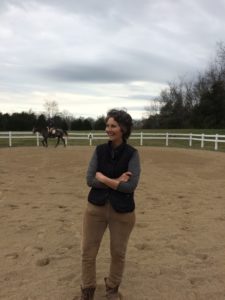
Carol Branscome, March 2016

